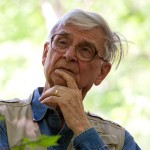Dr. E.O. Wilson

Dr. E.O. Wilson
University Research Professor Emeritus, Harvard University
Edward O. Wilson was born on June 10, 1929, in Birmingham, Alabama, and grew up in a series of towns in Alabama (principally Mobile) and Florida as well as Washington, D.C. After earning a B.S. and M.S. in biology at the University of Alabama, he joined the graduate program at University of Tennessee for a year, then transferred to Harvard University, where he earned a Ph.D. in 1955. From 1953 to 1956 he was a Junior Fellow in Harvard’s Society of Fellows. During this period he commenced a series of research field trips that were to take him, in various stages of his career, to many parts of the South Pacific and New World tropics. In 1956 he joined the Harvard faculty, where he is now Pellegrino University Research Professor Emeritus and Honorary Curator in Entomology.
Early in his career, Wilson conducted work on the classification and ecology of ants in New Guinea and other Pacific islands, and in the American tropics. In 1963 this work and his conception of species equilibrium led him to the theory of island biogeography, which he developed with the late Robert H. MacArthur of Princeton University. In the theory, immigration and extinction, the determinants of biodiversity at the species level, were tied to area, distance of islands from source regions, and the basic properties of ecology and demography. The work culminated in their 1967 book The Theory of Island Biogeography, which has been a standard reference work ever since. The theory greatly influenced the discipline of ecology and became a cornerstone of conservation biology. Applied to “habitat islands,” such as forests in a sea of agricultural land, it has influenced the planning and assessment of parks and reserves around the world. In the late 1960s Wilson, with Daniel Simberloff, conducted experiments in the Florida Keys that documented the basic principles of island biogeographic theory.
In the late 1950s and 1960s, Wilson also played a key role in the development of the new field of chemical ecology. With several collaborators he worked out much of the pheromone language of ants, and with William H. Bossert of Harvard University he created the first general theory of the physical and chemical properties of chemical communication. Because all plants and microorganisms, as well as the vast majority of animals, communicate primarily or entirely by pheromones, the importance of this work is considerable.
By the late 1970s, Wilson was actively involved in global conservation, adding to both original research and the promotion of biodiversity research. In 1984 he published Biophilia, which explored the evolutionary and psychological basis of humanity’s attraction to the natural environment. This work introduced the word biophilia into the language, and has been influential in the shaping of the modern conservation ethic as well as the new school of “biophilic” architecture. In 1988 Wilson edited the volume BioDiversity, based on the proceedings of the first United States national conference on the subject, which also introduced the term biodiversity to the language, now in universal usage. This work was very influential in creating the modern field of biodiversity studies. In 1992 Wilson published The Diversity of Life, which synthesized the principles and most important practical issues of biodiversity; this, too, became a standard work. His 2002 work The Future of Life has become equally influential. In 2003, he published Pheidole in the New World, A Dominant, Hyperdiverse Ant Genus, a monograph of 19 percent of the known ant species of the Western Hemisphere. Of the 624 species thus covered, 337 were new to science.
In 2006 he published The Creation: An Appeal to Save Life on Earth, which called for an alliance between science and religion to accelerate the global environmental movement and has had considerable impact in both religious and environmentalist groups.
While continuing his research on the systematics and biogeography of ants, Wilson has become increasingly involved in the global conservation movement. In addition to authoring other books and articles on the subject, and lecturing in many countries, he has served on the boards of directors of the American Museum of Natural History, Conservation International, The Nature Conservancy, and World Wildlife Fund, and has been a key consultant of the New York Botanical Garden, Columbia University’s Earth Institute, and many other environmental and scientific organizations.
In 1971 Wilson published his second major synthesis, The Insect Societies, which formulated the existing knowledge of the behavior of ants, social bees, social wasps, and termites, on a foundation of population biology. In it he introduced the concept of a new discipline of sociobiology, the systematic study of the biological basis of social behavior in all kinds of organisms. In 1975 he published Sociobiology: The New Synthesis, which extended the subject to vertebrates and united it more closely to evolutionary biology. The foundational discoveries of sociobiology are generally recognized to be the analysis of animal communication and division of labor, in which Wilson played a principal role, and the genetic theory of the origin of social behavior, which he helped to promote and apply in his 1971 and 1975 syntheses, and substantially revise in 2005. Sociobiology: The New Synthesis was later ranked in a poll of the officers and fellows of the international Animal Behaviour Society as the most important book on animal behavior of all time, and is regarded today as the founding text of sociobiology and its offshoot, evolutionary psychology.
Sociobiology: The New Synthesis also included a brief analysis of the origins of human nature. This stirred a bitter controversy on the role of biology in human behavior, which has now been largely resolved in favor of the sociobiological view. To more fully cover the subject of culture and answer scientific (as opposed to political) criticism, Wilson published the widely acclaimed On Human Nature in 1978, which won the 1979 Pulitzer Prize in General Non-Fiction. With Charles Lumsden he developed to the same end the first general theory of gene-culture coevolution (and introduced the term) in the 1981 work Genes, Mind, and Culture. Wilson’s novel Anthill, a conservation epic set in Alabama, was a N.Y. Times bestseller and won the Heartland Prize for fiction from the Chicago Tribune.
Six of Wilson’s 28 books to date (2012) form two trilogies. The first, The Insect Societies, Sociobiology, and On Human Nature (1971–78) founded sociobiology and evolutionary psychology. The second, The Diversity of Life, The Future of Life, and The Creation (1992–2006) organized the base of modern biodiversity conservation. Another three books form a third trilogy containing The Social Conquest of Earth (2012), The Meaning of Human Existence (2014) and Half-Earth: Our Planet’s Fight for Life (Spring 2016).
In 1998 Wilson extended his program of evolutionary thought in Consilience: The Unity of Knowledge, which argues for a reversal of the current fragmentation of knowledge and postmodernist ideologies and a return to the ideals of the original Enlightenment, including bridging of the sciences and humanities. He has also published books (with Bert Hölldobler) on fungus-growing ants and the biology of superorganisms. He is currently conducting field research on the ecology and biogeography of the ant faunas of the West Indies, southwest Pacific, and Mozambique.
Wilson is presently consulting with the U.S. National Park Service on biodiversity research and education. The E. O. Wilson Biodiversity Foundation, supported by Apple, produced the first completely digital, online, and free textbook on elementary biology.
The more than 100 awards received by Wilson from around the world in science and letters include the National Medal of Science, two Pulitzer Prizes for Non-fiction (for On Human Nature and, with Bert Hölldobler, The Ants), the Crafoord Prize of the Royal Swedish Academy of Science (given by the Academy in fields of science it does not cover by the Nobel Prize), membership in Sweden’s Royal Order of the Polar Star, Japan’s International Prize for Biology, the Prix de Institut de Vie, Paris, Italy’s Presidential Medal, the Tyler Prize for Environmental Achievement, the Gold Medal of the Worldwide Fund for Nature, the Audubon Medal of the Audubon Society, the Benjamin Franklin Medal of the American Philosophical Society, The Catalonia Prize of Spain, and Saudi Arabia’s King Faisal International Prize for Science. He also received both of the teaching prizes voted by the students of Harvard College. In 1995 he was named one of the 25 most influential Americans by Time Magazine, and in 2000 one of the century’s 100 leading environmentalists by both Time and Audubon Magazine. In 2005 Foreign Policy named him one of the world’s 100 leading intellectuals.
